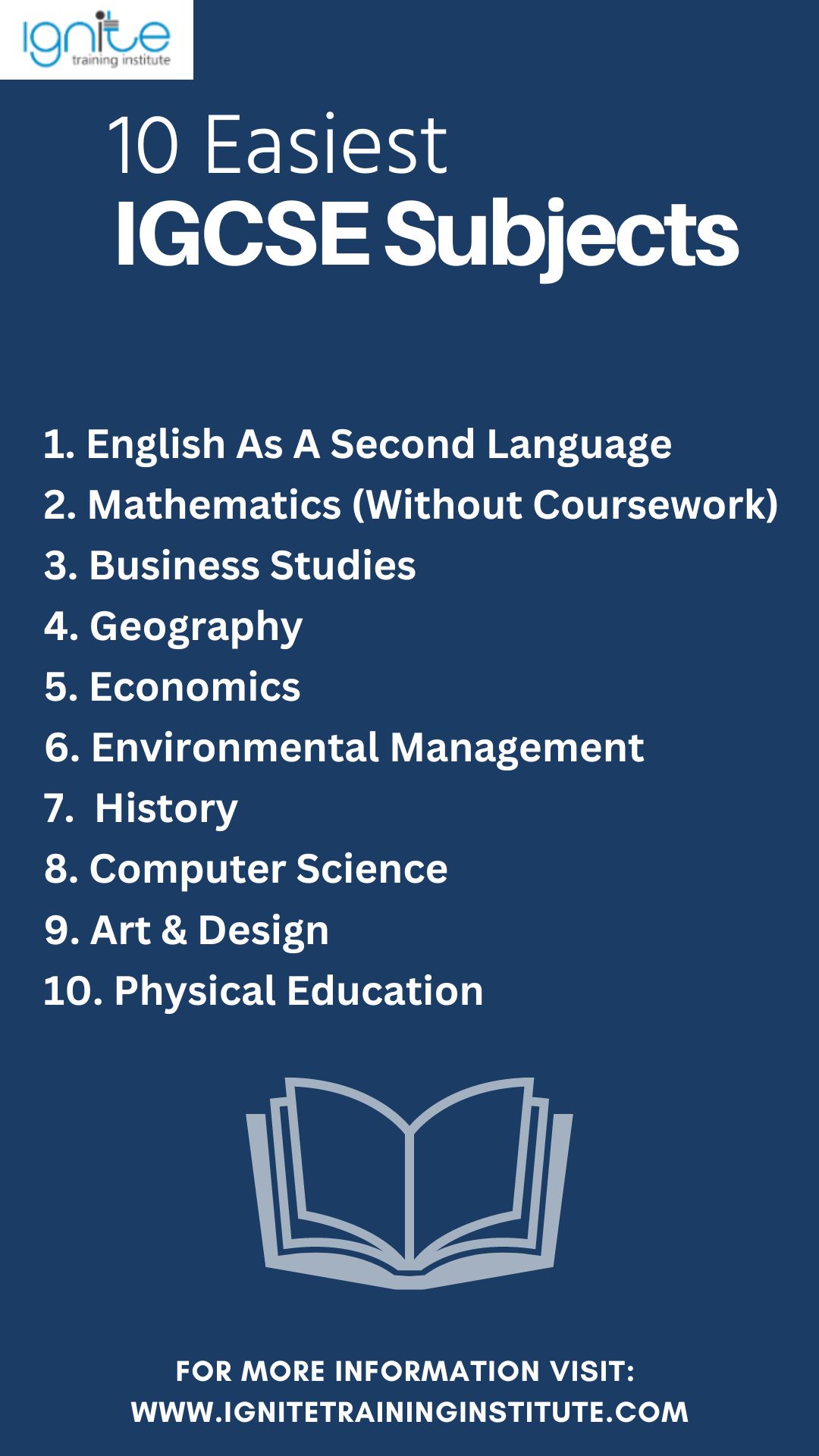Choosing the right subjects for your IGCSE exams can play a significant role in shaping your academic journey. In this blog, we will explore the subjects that are often considered easier, providing you with valuable insights to make informed decisions.
Whether you’re looking to excel in specific areas or seeking a balanced workload, understanding the easiest IGCSE subjects can help you strategize your study plan effectively. Join us as we delve into the world of IGCSE and discover the subjects that can make your academic journey a little smoother.
Ignite Training Institute offers comprehensive tutoring support for IGCSE students in Dubai, UAE, providing expert guidance and resources to excel in their studies. Get a free demo class today!

What Are The IGCSE Subjects?
IGCSE, which stands for International General Certificate of Secondary Education, is a globally recognized qualification for students in their final years of secondary education. The IGCSE curriculum is offered by exam boards like Cambridge, Edexcel, & AQA & covers a wide range of subjects, providing students with a strong foundation in various disciplines.
The IGCSE subjects span different fields, including sciences, humanities, languages, mathematics, and creative arts. Students typically can choose a combination of subjects based on their interests and future aspirations. Some common IGCSE subjects include Mathematics, English Language and Literature, Physics, Chemistry, Biology, History, Geography, Business Studies, French, Spanish, and Art and Design. Each subject is designed to develop critical thinking, problem-solving, and analytical skills, preparing students for further academic pursuits or professional careers.
The IGCSE program not only focuses on academic knowledge but also emphasizes the development of practical skills, such as research, communication, and independent thinking. It provides students with a well-rounded education and equips them with the necessary tools to succeed in their future endeavors. The diverse range of IGCSE subjects allows students to explore their interests, pursue their passions, and lay the foundation for their educational and career paths.
Related: Top Universities That Accept IGCSE Certificate In USA & UK
Which IGCSE Subjects Have The Highest Pass Rates?
Based on Cambridge International’s 2024 IGCSE results, the subjects with the highest pass rates—defined as students scoring a grade C (or grade 4) and above—are primarily language-based. Topping the list are First Language Subjects like German, French, Turkish, Mandarin, and Malay, with a pass rate of 97.9%, followed by English as an Additional Language (96.4%) and Italian (95.6%).
Creative and expressive subjects like Music (92.0%), Spanish (90.8%), and Drama (89.0%) also show high success rates. Interestingly, even traditionally tougher subjects like Physics made the top ten with an 80.5% pass rate, indicating strong overall student performance in 2024.
Related: 10 Proven Strategies On How To Study For IGCSE Exams & Excel
What Are The 10 Easiest IGCSE Subjects?
When it comes to choosing IGCSE subjects, some students may prefer to opt for subjects that they find comparatively easier or more manageable. While the perception of difficulty may vary from person to person, here are ten subjects that are often considered relatively easier for students:

1. English As A Second Language
This subject focuses on developing English language skills, including reading, writing, listening, and speaking. Many students find it easier to grasp compared to other subjects due to its practical nature and the everyday use of English.
2. Mathematics (Without Coursework)
Mathematics can be challenging for some students, but the non-coursework option in IGCSE allows students to focus on core mathematical concepts and problem-solving techniques, making it more approachable.
3. Business Studies
This subject introduces students to basic business concepts, such as marketing, finance, and operations. It often involves real-world case studies and practical applications, which can make it easier for students to understand and relate to.
4. Geography
Geography explores the Earth’s physical features, climate patterns, and human-environment interactions. It involves map reading, data analysis, and essay writing, which many students find manageable and interesting.
5. Economics
Economics introduces students to fundamental economic principles, such as supply and demand, market structures, and government policies. It combines theory and real-world examples, making it accessible and relevant for students.
6. Environmental Management
This subject focuses on environmental issues and sustainability. It involves studying ecosystems, conservation strategies, and the impact of human activities on the environment. Many students find it engaging and relatively easier to grasp.
7. History
History offers a chronological study of significant events, societies, and individuals throughout different time periods. It involves analyzing primary and secondary sources, understanding cause-and-effect relationships, and forming arguments based on evidence.
8. Computer Science
This subject introduces students to computer programming, algorithms, and problem-solving techniques. It can be easier for students who have an interest in technology and logical thinking.
9. Art & Design
Art and Design allow students to express their creativity through various mediums such as drawing, painting, sculpture, and digital art. It can be a subject where students can explore their artistic abilities and enjoy the process.
10. Physical Education
This subject focuses on developing physical fitness, sports skills, and knowledge of health-related topics. It involves practical activities, theory-based learning, and personal fitness assessments.
It’s important to note that while these subjects are often considered relatively easier, individual preferences, strengths, and interests play a significant role in determining a student’s success and enjoyment in any subject.
Related: IGCSE VS GCSE: Key Differences & Which Offers More
How Many IGCSE Subjects Are Required?
The number of IGCSE (International General Certificate of Secondary Education) subjects required varies depending on the educational institution, country, and individual student’s academic goals.
Typically, students are advised to take a minimum of five IGCSE subjects to obtain a full IGCSE qualification, although some schools may require more. These five subjects often include English as a first or second language, Mathematics, and a selection of science, humanities, or language subjects.
However, many students choose to take more than five subjects to broaden their academic scope, showcase their strengths, and enhance their university or career prospects. Students need to research the specific requirements of the universities or educational pathways they intend to pursue and choose IGCSE subjects accordingly to meet those requirements.
Additionally, students should consider their interests, career aspirations, and aptitudes when selecting IGCSE subjects to ensure a fulfilling and well-rounded academic experience.
Related: Why Choose Cambridge? 10 Must-Know Reasons For Students
What Are The Compulsory Subjects For IGCSE?
The International General Certificate of Secondary Education (IGCSE) offers a broad and flexible curriculum designed to cater to the diverse learning needs and interests of students worldwide. While the specific compulsory subjects may vary depending on the educational institution, country, or examination board, there are typically a few core subjects that are widely regarded as essential for obtaining an IGCSE qualification.
- English Language: Proficiency in English language skills is fundamental for academic success and communication in a global context. Therefore, English Language is commonly a compulsory subject for IGCSE, ensuring that students develop strong reading, writing, speaking, and listening skills.
- Mathematics: Mathematics is a fundamental subject that provides students with essential problem-solving skills, logical reasoning, and quantitative literacy. Most educational institutions require students to study Mathematics as a compulsory subject at the IGCSE level to ensure a solid foundation in mathematical concepts and techniques.
- Science: IGCSE typically offers a range of science subjects, including Biology, Chemistry, and Physics, among others. While the specific science subject may vary based on individual preferences and educational goals, many institutions require students to study at least one science subject to develop an understanding of scientific principles and processes.
In addition to these compulsory subjects, students often have the flexibility to choose from a wide range of elective subjects based on their interests, career aspirations, and future educational pathways. These elective subjects may include Humanities (such as History, Geography, or Economics), Languages (such as Spanish, French, or Mandarin), and Arts (such as Music, Art and Design, or Drama), among others.
Related: Is O Level And IGCSE The Same? Differences & How To Choose
What Factors Make An IGCSE Subject Easy Or Difficult?
Choosing the right IGCSE subjects can be one of the most important decisions in a student’s academic journey. While some subjects may seem “easy” and others “difficult,” the reality is that this varies widely from student to student. What makes a subject challenging or manageable often depends on a mix of personal aptitude, interest, teaching quality, and assessment format. Let’s explore the key factors that influence the perceived difficulty of an IGCSE subject.
1. Student’s Strengths & Interests
The most crucial factor is the student’s natural abilities and passions. A student who enjoys reading and writing may find English Literature engaging and accessible, while someone with a flair for numbers may breeze through Mathematics or Accounting. Interest leads to motivation, which makes learning feel easier and more enjoyable.
2. Conceptual VS Practical Nature
Subjects like Physics, Chemistry, and Mathematics are often considered harder because they require a strong conceptual understanding and problem-solving skills. In contrast, practical or application-based subjects such as Business Studies or ICT may be easier for students who prefer real-world examples and straightforward applications.
3. Volume Of Content To Learn
Some subjects have a broader syllabus with a lot of memorization required. For instance, History and Biology often involve remembering detailed facts, events, or terminology. The sheer volume of information can make these subjects feel overwhelming for some students.
4. Assessment Style & Exam Format
The way a subject is assessed plays a big role. Subjects with essay-based answers (like History or English Literature) require strong writing and analytical skills. On the other hand, subjects like Mathematics or Physics focus more on accurate calculations and formula-based answers. Some students may find objective or structured answers easier than writing long, open-ended essays.
5. Language Barrier
For students whose first language is not English, subjects with heavy language demands like English Language, Literature, or History may be harder. The need to comprehend complex texts and express ideas clearly can add to the challenge.
6. Quality Of Teaching & Resources
Even the hardest subjects can become manageable with the right teacher. The clarity of instruction, availability of resources, and access to practice materials can significantly affect how students perceive the difficulty of a subject. A good tutor or school support system can make a world of difference.
7. Grading Trends & Subject Popularity
Some subjects are perceived as easier because of trends in past grade distributions. Subjects like Environmental Management or Global Perspectives may have higher average grades, leading to the impression that they are easier to score in. However, this can vary from year to year and across examination boards.
8. Subject Combinations & Workload Balance
Difficulty can also depend on what other subjects a student is taking. Choosing multiple content-heavy or calculation-based subjects together can increase workload and stress. Balancing subject types—like combining a science, a language, and a humanities subject—can help distribute effort more evenly.
Related: Triple Science VS Combined Science: What To Choose?
Importance Of Choosing The Right IGCSE Subjects
Choosing the right IGCSE subjects is a crucial decision that can greatly impact a student’s academic journey and future career options. Here are some reasons why selecting the appropriate subjects is important:
1. Tailored Education: Each student has unique strengths, interests, and career aspirations. By choosing the right IGCSE subjects, students can tailor their education to align with their individual goals. They can focus on subjects that they enjoy and excel in, fostering a sense of motivation and engagement throughout their studies.
2. Higher Education Requirements: Certain universities and colleges may have specific subject requirements for admission into their programs. It is essential to research and understand the prerequisites of the desired higher education institutions. By choosing the right IGCSE subjects, students can meet these requirements and increase their chances of getting into their preferred academic institutions.
3. Career Pathways: Different subjects can open doors to various career pathways. For example, selecting science subjects like Physics, Chemistry, and Biology can pave the way for careers in medicine, engineering, or scientific research. On the other hand, subjects like Business Studies, Economics, and Accounting can lead to opportunities in finance, management, or entrepreneurship. Choosing the right IGCSE subjects aligned with one’s career aspirations can provide a solid foundation for future professional success.
4. Personal Growth & Skill Development: IGCSE subjects offer a wide range of skills and knowledge beyond academic concepts. By choosing subjects that challenge and stimulate students’ intellectual curiosity, they can develop important skills such as critical thinking, problem-solving, communication, and research skills. These skills are valuable not only in academia but also in the real world, preparing students for future challenges and enhancing their personal growth.
5. Well-Rounded Education: While focusing on specific subjects related to future career goals is important, it is also essential to have a well-rounded education. Choosing a diverse combination of IGCSE subjects, including languages, humanities, and sciences, can provide students with a broader perspective and a holistic understanding of the world. It allows them to develop a range of skills and knowledge that can be applied in various contexts and enrich their overall educational experience.
Related: List Of Best-Reviewed IGCSE Schools In Dubai
Tips To Succeed In The Easiest IGCSE Subjects
While some IGCSE subjects may be considered easier due to simpler concepts or higher average scores, success still requires smart preparation and consistent focus. Scoring top grades in these subjects isn’t just about knowing the content — it’s about using the right strategies.
Here are some effective tips to help you make the most of your strengths and excel in the easier IGCSE subjects:
- Understand The Syllabus Thoroughly
Start by reviewing the official IGCSE syllabus for each subject. Knowing exactly what’s expected helps you focus on relevant content and avoid wasting time. - Practice Past Papers Regularly
Many easier subjects, like English as an Additional Language or Music, follow predictable patterns in exams. Solving past papers helps you get familiar with question styles and manage time effectively. - Focus On Application, Not Just Theory
In subjects like Drama, Music, or First Language papers, applying concepts through performances, presentations, or practicals is just as important as written work. - Use Multimedia Learning Tools
Leverage videos, podcasts, and interactive apps for language and arts-based subjects. These tools make learning engaging and help retain information better. - Strengthen Exam Techniques
Mastering how to structure answers, manage exam time, and identify keywords in questions can make a big difference—especially in subjects where high pass rates mean the competition for top grades is tight. - Revise Smart, Not Just Hard
Use flashcards, summaries, and mind maps to revise. Focus more on your weaker areas, even if the subject feels easy overall.
Related: Cambridge IGCSE: Comprehensive Guide For Parents & Students
Ignite Training Institute – Best IGCSE Coaching In Dubai
Ignite Training Institute stands out as one of the best IGCSE coaching centres in Dubai, known for its personalized tutoring, subject expertise, and proven student success stories. With a team of highly qualified tutors, Ignite offers comprehensive academic support across all IGCSE subjects including Math, Sciences, English, and more.
Whether you’re aiming for top grades or need help mastering core concepts, Ignite ensures every student receives focused guidance tailored to their learning pace and goals. Backed by a track record of outstanding results and 2200+ student success stories, Ignite’s IGCSE tutoring is designed to align with Cambridge, Edexcel, & AQA exam boards to ensure that students are well-prepared and confident.
FAQs
1. Which Subject Is The Easiest To Take In IGCSE?
The easiest IGCSE subject varies by student, but many find Art and Design, Physical Education, or Environmental Management easier due to their practical and coursework-based assessments. Choosing subjects of genuine interest and strength often leads to better performance and enjoyment.
2. Which Is The Hardest Subject In IGCSE?
The hardest subjects in IGCSE often vary among students, but many find IGCSE Additional Mathematics and IGCSE Physics particularly challenging due to their complex concepts and problem-solving requirements. The perceived difficulty can depend on individual strengths and interests.
3. Which Subject Is Best For IGCSE?
The best subject for IGCSE depends on a student’s interests and strengths; popular choices include Mathematics and Sciences for their broad applications, or English and History for those inclined towards humanities. Ultimately, selecting subjects aligning with future academic and career goals is crucial.
4. Which Is The Easiest O-Level Subject?
The easiest O-level subject is often considered “Religious Studies” due to its straightforward content and emphasis on memorization. However, the perceived difficulty can vary based on individual strengths and interests.
5. What Are The Hardest IGCSE Subjects?
Subjects like IGCSE Additional Mathematics, Physics, Chemistry, and English Literature are often considered the hardest due to complex concepts, abstract thinking, and intensive exam formats.
6. How Is The Difficulty Level Of An IGCSE Subject Determined?
The difficulty level is typically based on the depth of content, analytical skills required, historical grade trends, and student performance data across exam boards.
7. Are There Any Mandatory IGCSE Subjects To Take?
There are no globally mandatory IGCSE subjects set by Cambridge; however, most schools require students to take core subjects like English, Mathematics, and Science as part of their curriculum.
8. Can You Take Additional IGCSE Subjects?
Yes, students can take additional IGCSE subjects if they can manage the workload. Many high-achievers opt for more than the usual 6–8 subjects to broaden their academic profile.
9. Which Is The Easiest IGCSE Exam Board?
Edexcel is often considered more student-friendly in terms of question structure, while Cambridge IGCSE may be seen as more rigorous. However, “easiest” can vary by subject and student strengths.
10. Which Are The Top 10 Easiest Subjects In The World?
Subjects like Physical Education, Environmental Science, Media Studies, Art, Music, and General Studies are commonly seen as easier due to practical formats or lighter theoretical content.
11. Can You Choose Multiple Easy IGCSE Subjects?
Yes, students can select multiple easier subjects, but it’s important to balance them with academically strong subjects to meet university prerequisites and maintain a competitive profile.
12. Can I Change IGCSE Subjects Midway Through The Course?
It’s possible to change IGCSE subjects early on, but it depends on school policies and how far along you are in the syllabus. Catching up in a new subject can be challenging.
13. What Are The Most Useful IGCSE Subjects For University?
Subjects like Mathematics, English, Sciences, and a foreign language are highly valued. Choices should align with your intended A-Level subjects and university course requirements.
14. How Do I Choose The Right IGCSE Subjects For My Career Goals?
Consider your interests, strengths, and future career path. For example, aspiring engineers should choose Physics and Math, while budding lawyers might focus on History and English.
15. How Is IGCSE First Language English Different From English Literature?
IGCSE First Language English focuses on reading comprehension, writing, and language use, while English Literature emphasizes the analysis of poetry, prose, and drama texts.
16. Do Top Universities Prefer Certain IGCSE Subjects?
Yes, top universities often favor core and academically rigorous IGCSE subjects like Maths, Sciences, and Languages. Some may also look at subject combinations related to intended degree courses.
Takeaway

In conclusion, choosing the easiest IGCSE subjects can greatly contribute to a student’s academic success and overall confidence. By selecting subjects that align with their interests and strengths, students can maximize their potential and achieve excellent results.
However, it’s important to remember that individual preferences and aptitudes may vary. It is always advisable to consult with teachers, counselors, and parents to make informed decisions.
Regardless of the chosen subjects, dedication, consistent effort, and effective study strategies are key to excelling in the IGCSE examinations. With proper planning and support, students can confidently navigate their IGCSE journey and set a solid foundation for their future academic pursuits.
Related: IGCSE Grades Explained: A Breakdown Of A To G And 9–1*


